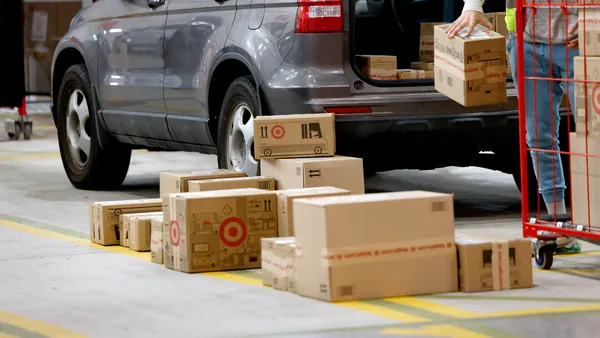Dive Brief:
- FedEx had the most profitable December in the company's history despite "softer than anticipated volume," as the carrier took in more than $250 million in peak season surcharge revenue, Chief Marketing and Communications Officer Brie Carere said on the company's Q3 earnings call Thursday.
- Carere attributed the soft December volumes in part to the company constraining growth of its home delivery-focused FedEx Ground Economy service in order to improve "revenue quality." There was also a push for retailers and carriers to move packages earlier in the peak season, resulting in a "pull-forward" of volume to November.
- Although the peak season is over, shippers will soon face new added costs in the form of higher fuel surcharges. FedEx announced Thursday an increase to its fuel surcharge that will take effect April 4 after the company's fuel expense increased 59% in the third quarter.
Dive Insight:
FedEx's volumes were also softer than expected in January as the omicron variant of COVID-19 slowed customer demand and introduced labor constraints in its network, CFO Mike Lenz said. Absences among FedEx Express pilots resulted in flight cancellations and further constrained capacity, he added.
Although volumes were relatively light in the quarter, FedEx made more off the packages it did deliver.
Average daily volume in Q3 was about flat YoY for FedEx Ground, but revenue per package increased 9%, according to FedEx's quarterly financial report. At FedEx Express, average daily volume fell 11% while revenue per package increased 19%.
Improving per-package revenues is crucial for carriers like FedEx and UPS, who have both grappled with a surge in home delivery volumes that aren't typically as profitable as B2B shipments.
UPS is taking a "better, not bigger" approach under CEO Carol Tomé, pursuing higher-margin deliveries instead of accepting every possible package. On FedEx's side, President and COO Raj Subramaniam described on the call its strategy to position itself "squarely in the center of the fast-growing e-commerce market with a differentiated portfolio and a diversified customer base" while growing its network to meet demand.
"Let me note here that this strategy is different than what our primary competitor has pursued," Subramaniam said. "By building on our current base of business and making those prior investments in our network to facilitate growth, we are in a position to generate improved operating profit and margins."
As the parcel duopoly pursues higher profit margins, customers are getting squeezed by higher shipping rates and added surcharges that have become more prevalent since the pandemic-driven volume surge. FedEx's fuel surcharge hike will add further pressure on shippers.
Higher fuel prices are one of the many ripple effects of Russia's invasion of Ukraine, which led FedEx to suspend all services in those countries in addition to Belarus. The suspension of services "has not had and is not expected to have a material impact on our operating results," FedEx said in its quarterly financial filing.














